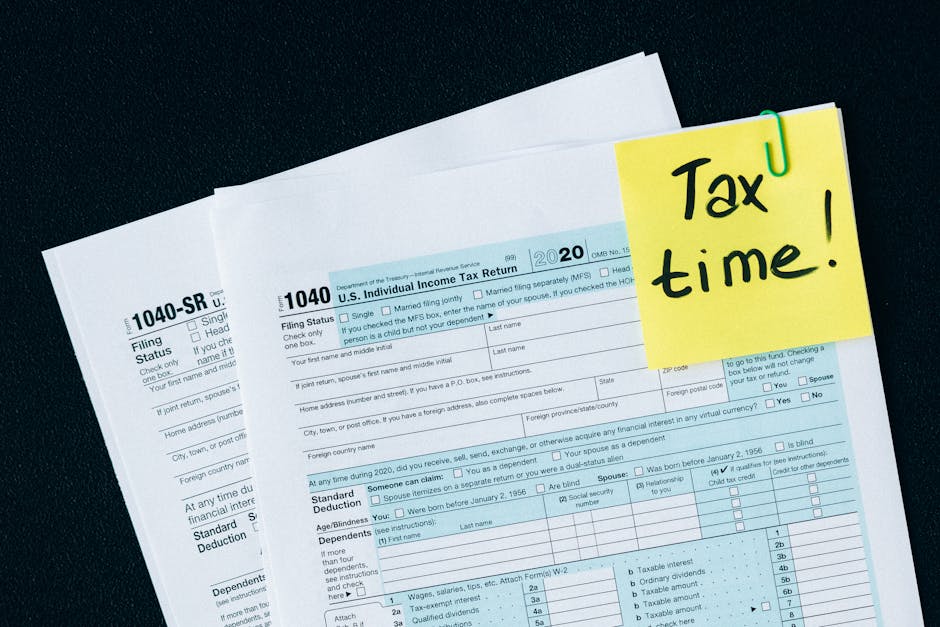Introduction
Let’s dive into a maze of figures, regulations, and financial planning with a guide: Managing Your Taxes. Tempting as it might be to wrap this term in ambiguity, managing taxes simply refers to the strategic approach you take to understand, plan, and file your taxes to avoid unnecessary liabilities and penalties. It’s like playing a board game where you have to understand the rules to maximize your chances of winning – except in this game, the stakes are infinitely higher.
The importance of efficient tax management cannot be overstated. In a world where every dollar counts, navigating your taxes with expertise can potentially save you from stepping on the landmines planted within the intricate laws and rules of taxation. It goes without saying that springing those traps will depreciate your returns, leaving you with less of your hard-earned income.
Defusing those mines and planning your moves requires an encyclopedic knowledge of tax management strategies that adapt to your income sources, lifestyle, and even life goals. Think of it as a complex puzzle with multiple solutions, where making the right decisions could lead to huge savings. Challenging? Yes. Worthwhile? Absolutely. Integrating effective tax management strategies into your financial plans can lead to smoother financial navigation and greater peace of mind. Buckle up, folks – let’s learn to manage those taxes like a pro!

Understanding Taxation
In order to firmly grasp tax management, we must first delve into the nitty-gritty of basic taxation principles. Essentially, taxes are compulsory contributions to state revenue, which the government uses to fund a variety of public services and welfare initiatives. In most cases, these taxes are levied on income, profits, and goods/services purchased.
Next, let’s decode the concept of tax brackets. All countries have a system to tax incomes, but not all incomes are taxed equally. The income tax structure is often divided into brackets or ranges of incomes that are taxed at different rates, progressing from low to high. For instance, individuals with lower income may fall into a lower tax bracket and thereby be charged a lower rate, while those with higher income would be in a higher bracket and be charged at a higher rate. Understanding your tax bracket can help you predict your tax liability and devise strategies to legally minimize your tax obligations.
Finally, an important distinction to make in the world of taxation is between direct and indirect taxes. Direct taxes are those you pay directly to the government – like income tax, which is subtracted from your earnings. Indirect taxes, on the other hand, are collected by intermediaries from the person who bears the ultimate economic burden of the tax – such as sales taxes, which are collected by businesses and passed on to the government. Understanding the nuances between these two can significantly impact how you manage your taxes.
In the scheme of things, comprehending these foundations will assist you in your endeavour towards efficient tax management. By knowing what to expect and where the possibilities lie, you can better navigate the labyrinth that is taxation.

Importance of Efficient Tax Management
Now, you can’t step into the realm of taxation without understanding the actual worth of efficient tax management. Picture this: you as an individual, armed with pertinent tax know-how, navigating the landscape of taxation akin to a seasoned mariner guiding their ship through tumultuous seas. Sounds a bit dramatic, right? However, strategic tax management sure packs a punch in terms of benefits it offers.
One – it allows you to save hard-earned money. No, we’re not implying that you punt on your taxes. Instead, the idea is to effectively manage your taxable income through leveraging legal routes such as deductions, credits, and strategic investments. Proper tax management can lead to higher tax returns, also known as a happy payday for you.
Now, let’s flip the coin to the other side – poor tax management. What does it look like? Think of it as a box of unpleasant surprises. Without a proper tax management strategy, you might find yourself paying more than you should, thanks to missed deductions or credits. Even worse, shoddy management might bite back in the form of penalties for underpayments or late filings. Sure, there might not be any immediate repercussions of cavalier tax management, like an expiration date on a milk jug, but disappointments could open up down the line.
So, more than understanding taxation, it’s important to appreciate the role of effective tax management. The end goal of the game is to minimize liabilities and maximize returns. By placing importance on efficient tax management, twisting and turning it until it fits into your financial picture, you’re not just playing it safe – you’re playing it smart.

Developing Efficient Tax Strategies
Developing efficient tax strategies is not an accidental process. It involves careful planning, a detailed assessment of the various financial activities, and weighing out how each one of these impacts your tax situation. It’s like playing chess with Uncle Sam – your every move has immediate impact, but it is the long-term strategy that can often decide the outcome.
One of the first steps towards developing efficient strategies involves understanding where your money is going. Our financial transactions – right from cash inflow to expenditure – decide the amount we owe in taxes. For instance, if you are deeply invested in real estate, the rental income procured counts as taxable income. The nature of your investments, any cash inflow like an unexpected lottery win, and adjustments in your retirement contributions – all of these can have varying degrees of effect on your tax obligation.
Part of an efficient tax strategy also involves managing investments in a strategic way. Not all investment types are taxed identically. Some investments may be eligible for tax deductions or exemptions. A smart approach would be to gain knowledge of tax-friendly investment options and consider having them in your financial portfolio. For example, certain savings accounts can offer tax breaks, IRAs and 401(k)s offer tax advantages for retirement savings, and tax-loss harvesting can further help reduce your capital gains taxes.
Strategic tax management is not just about maxing out your deductions. It’s about analyzing one’s financial situation and tailoring tax strategies accordingly. The goal should always be to reduce taxable income without decreasing one’s quality of life.
In a nutshell, developing efficient tax strategies involves a broad understanding of one’s finances, astuteness to make tax-friendly choices, and the prerogative to implement these strategies consistently. As they say, “it’s not about how much you make, but how much you keep, how hard it works for you, and how many generations you keep it for.” So, learning to navigate the complicated maze of tax management can ensure that your hard-earned money works for you in the best way possible.
Remember, the arena of taxation is ever-evolving, and it can sometimes be tough to keep up with the updates. Hence, always be ready to revise and recharge your tax strategies.

The Role of Tax Deductions and Credits
When it comes to efficient tax management, a significant element to focus on is certainly the realm of tax deductions and credits. These are not merely nice-to-haves; they’re integral financial power tools that can seriously reduce your overall tax blow, if used strategically.
Let us now demystify tax deductions and credits. Tax deductions lower your taxable income, potentially placing you in a lower tax bracket and thus reducing the amount of tax you owe. For instance, if your income is $50,000 and you have deductions worth $10,000, you will be taxed on $40,000. As for tax credits, they directly reduce the amount of tax you owe dollar for dollar. For example, a $1,000 tax credit actually reduces your tax bill by $1,000.
The magic lies in leveraging these financial tools to your advantage. Key things to keep in mind are tracking your eligible expenditures accurately throughout the year and ensuring that you claim all deductions and credits for which you qualify. This strategy could lead to considerable savings, allowing your hard-earned money to serve you better.
However, the landscape of tax deductions and credits is often changing and can be complicated. To provide you with a brief overview, deductions can range from home mortgage interest, medical expenses, to student loan interest payments and charitable donations. Each has specific qualifications and cap limits. Meanwhile, tax credits can be non-refundable (can reduce your tax liability to zero) or refundable (can reduce your tax liability below zero, potentially leading to a refund). They could be education credits, child tax credits, earned income tax credits, and more.
Who qualifies for these deductions and credits is a vast topic on its own. Factors like your income level, job situation, personal circumstances, and number of dependents can all influence whether you qualify for certain deductions and credits.
Leveraging tax deductions and credits is a strategic play to reduce your annual tax blow. However, it requires an in-depth understanding of the regulations, constant vigilance for changes in tax law, meticulous record-keeping, and utility of the right financial tools or help from tax professionals. The payoff, on the other hand, could be a boost in your tax returns and a sense of triumph over the complexities of tax management.

Common Mistakes in Tax Management
When managing taxes, it’s quite common for individuals to make certain errors – some due to lack of knowledge, others due to negligence. These mistakes can often lead to consequences more severe than just a slap on the wrist from the IRS.
One common mistake is failing to report all income. This isn’t just your 9-to-5 paycheck, folks. If you made any money on the side, earned any freelance income, or if you have any investments, that income must be reported on your tax return. Not doing so can lead to penalties due to underpayment of taxes.
Misunderstanding tax deductions is another frequent slip-up. Some individuals either claim deductions they’re not eligible for, or they miss out on deductions that could save them a substantial amount of money. This is often the result of not fully understanding tax laws or overlooking possible deductions in the rush to get tax filings done.
Late filing and payment is another common tax faux pas. Procrastination might be an inherent part of human nature, but when it comes to the IRS, it’s best to keep that trait in check. Not only does this mistake lead to hefty fines, but it also triggers a higher interest rate on the owed taxes.
Perhaps the most avoidable error of all: mathematical and typo errors. In today’s digital age, tax software can help mitigate this, but if you decide to go old-school with pen and paper, do your due diligence. Always double-check or even triple-check your numbers. Remember, an error could lead to an audit or at least, unnecessary delays in processing your return.
Avoiding these common tax mishaps is achievable with a little care and attention. Always report all your income, understand your deductions, file and pay on time, and ensure your calculations and entries are correct. It might seem like a lot, but with good tax strategies and planning, these mistakes can be easily avoided, paving the way for maximum tax returns.

Role of Tax Consultants
Tax management is like navigating a labyrinth – complex, time-consuming, and often challenging to exactly figure out where you might end up. This is where tax consultants come to our aid. They act as guides that navigate us through this vast maze of tax regulation, helping us make wise decisions, and avoid costly errors.
Tax consultants, or tax advisors, are financial experts specially trained in tax law. They’re the powerhouse of knowledge you access when dealing with complicated tax issues. Their role primarily revolves around providing insights and advice to individuals or businesses to ensure that they are paying their taxes correctly and efficiently, while also leveraging every possible opportunity for a return.
Consider tax consultants as your personal tax-lifeboat builders. They help you to construct a robust tax-strategy that will keep you afloat, no matter how turbulent the tax-seas may get. They review your income, expenses, and financial goals to make informed decisions that will offer you a maximum tax benefit.
Now, the question arises: when and why would you need to hire a tax consultant?
Well, if your financial situation is relatively straightforward, say you’ve only got a single source of income and no investments or real estate, you probably can do your taxes independently. But, if your tax situation starts involving stuff like side businesses, rental properties, income from various sources, or even if you’re just unclear about certain tax laws, it’s a good call to get a tax consultant on board.
Hiring a tax consultant is also valuable if you need specific tax advice, want to file an amended return, deal with an inherited property, or if you’re facing some sort of trouble with the tax folks – like an audit. They can systematically investigate your tax profile, discuss your needs, and devise strategies to manage your tax payments that are fully compliant with the law while still aiming for maximum returns on your income.
Remember, tax consultants don’t necessarily eradicate the storm, but they do provide you with the tools and strategies necessary to weather it. In other words, they help you to manage your taxes efficiently so that you can maximize your returns and worry less about that April deadline, leaving you free to focus on the more enjoyable aspects of life.

Utilizing Tax Software
In an era where technology is central to almost all aspects of our lives, tax management has not been left behind. Enter tax software – an intuitive platform that simplifies and streamlines the entire process of managing and filing your taxes. Tax software empowers you by giving you control, accessibility, and a clear view of how each transaction affects your tax standing.
Different Types of Tax Software
Tax software comes in varied shapes and sizes, each offering its unique variety of benefits. Here are some common names in the industry:
- TurboTax
- H&R Block
- TaxAct
These tools offer features that allow you to understand and apply deductions and credits, keep track of your income, investments, and expenses, and file your taxes with ease.
Ease of Use
One of the significant advantages of tax software is their ease of use. They are usually designed with a user-friendly interface that guides you, step by step, through the entire tax preparation process. Most even offer features like:
- Automatic error detection
- Helpful tips
- Built-in calculators for accurate calculations
These advantages make it possible even for individuals with no background in taxation to manage their taxes efficiently.
Tax Education Resources
Tax software also offers resources for tax education. If you’re confused about a deduction or need clarity on a tax law change, they provide FAQs, help centers, or customer support to help guide you. This feature empowers you not just to manage your taxes, but to understand them better.
Efficiency
The efficiency of tax software is one of its crowning glories. Where manual tax computations can take many hours, these platforms can crunch numbers in no time. This efficiency could prove crucial as tax deadlines approach.
Accuracy and Savings
Perhaps most importantly, tax software use can result in accuracy and more significant tax savings. The in-built checks and alerts ensure full and correct disclosure, minimizing chances of penalties or additional interest due to missed or erroneous entries. This feature can help you maximize your returns and manage your taxes more efficiently.
Conclusion
To sum it up, managing taxes isn’t about being a genius mathematician or a seasoned accountant. It’s about finding the right tools and resources that can break down complex tax laws into something more manageable and understandable. And tax software provides just that. Remember, in the world of taxation, knowledge, efficiency, and timeliness are truly power!

Need for Regular Tax Planning
When it comes to managing taxes effciently, many people go wrong by viewing it as a one-off effort rather than a regular devotion. However, this approach often leads to incomplete documentation, missed details, and subsequently, overpayments or penalties. This section will underscore why it’s absolutely essential you plan regularly for your taxes.
Think of tax planning like scheduling regular tune-ups for your car. In both cases, regular maintenance helps to optimize performance and spot early signs of potential problems. Tax planning shouldn’t be left until the last minute. It’s more of a marathon than a sprint and requires continuous attention and adaptation to achieve maximum results.
So how often should you plan for taxes? It could be monthly, quarterly, or yearly, depending on your financial situation and comfort level. Monthly tax planning might be beneficial for those with intricate financial maneuvers, like freelancers or small business owners. Frequently updating your financial status can provide a clearer picture of your taxable income, thereby enabling you to manage your taxes efficiently.
Quarterly tax planning, on the other hand, can be a great fit for those with relatively steady income streams and fewer financial intricacies. This strategy allows you to adjust your deductions or contributions in a more manageable way.
Even if you choose to maintain only an annual tax plan, the key is to be proactive — update it regularly as new fiscal information unfolds. For instance, if you incur unexpected expenses, receive bonuses, or make extra income, these should be factored into your plan.
Regular tax planning is not just about avoiding penalties or accurate tax filing. It’s also a strategic move towards better financial health. It provides the window of opportunity to leverage certain tax codes, such as deductions and credits, to reduce your tax liability.
In summary, regular tax planning is a proactive and strategic approach towards efficient tax management. It offers you the control and the flexibility to maximize your returns better compared to one-off efforts.

Conclusion
As we bring down the curtains on this extensive discourse about tax management, let’s appreciate the connected strands of ideas running through every section. Efficient tax management isn’t just a buzzword; it’s a systematic approach that can play a significant role in optimizing your returns. Whether you’re self-employed, salaried, or running a fortune 500, you simply can’t afford to look away from the potential gains of strategic tax planning and management.
Stepping away from one-off efforts, let’s encourage a cultural shift towards being conscious tax citizens. This involves a continuous commitment to understanding the tax principles, identifying beneficial tax strategy, leveraging tax deductions and credits, shying away from common tax mishaps, and embracing the help offered by tax consultants and software.
It might feel like a steep hill to climb at first, especially digesting dense tax jargon and norms. But as your understanding evolves, you’ll begin to see the silver lining – in the form of substantial tax savings and maximized returns. And trust us; this doesn’t happen by accident.
Your navigation towards tax efficiency might be slow, but steadfast steps ensure long-term benefits. Delve deeper into the tax world, staying curious and never hesitating to ask for professional help where necessary. As you gradually become a savvy tax citizen, rest assured, your return-on-tax-efforts will be a sight to behold.
And remember, as Benjamin Franklin once quipped, “an investment in knowledge pays the best interest.” Investing in your tax knowledge today might be the best financial decision you’ll ever make. Good luck with your tax endeavor, and may the returns be ever in your favor.